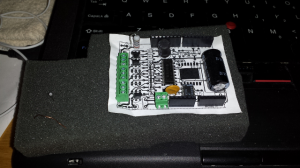The Atmel AVR family of microcontrollers is our favorite solution for embedded electronic projects. As you know, this family is what the popular Arduino platform uses cialis preis apotheke. However, for our projects we have never used the Arduino integrated development environment (IDE), or Arduino libraries. Instead, we have stuck with AVR libc mainly so we can have more control over our firmware and to try to have firmware with a smaller footprint in terms of both execution and image size.
Because we have not been using the Arduino IDE, we have always uploaded firmware to the AVR microcontroller using an in-system programmer (ISP) (the ISP programmer we use is the inexpensive USBtiny). This has been a requirement because our microcontrollers do not normally have a boot loader that allows them to be flashed via the serial port, unlike the Arduino, which does not expose the SPI through a connector that allows someone to hookup an ISP programmer, and therefore has to be programmed
Recently, however, we bought a Moteino, a very nice Arduino-compatible board, that has a boot loader that is compatible with the Arduino IDE. This required us to come up with a way to upload firmware to this board. We originally thought about soldering an adapter to use the AVR’s Serial Peripheral Interface (SPI), which uses the three signals Serial ClocK (SCK), Master In-Slave Out (MISO) and Master Out-Slave In (MOSI), and then use our USBtiny ISP programmer.
However, it turns out that is a lot easier than that — the AVRDUDE software can actually program Arduino-compatible boards directly, without using the SPI interface. We probably should have guessed this because, as we understand it, the Arduino IDE actually uses AVRDUDE to upload firmware to the target.
A sample AVRDUDE invocation looks like this:
shell$ avrdude -p atmega328p -c arduino -P /dev/ttyUSB2 -y -U flash:w:primus.hex
This is what the command-line arguments do:
- -p atmega328p: specifies the type of target microcontroller.
- -c arduino: specifies the programmer type. We understand that stk500v1 should work, and we have seen online references that seem to indicate that is what the Arduino IDE uses, but stk500v1 did not work for us. Instead, our AVRDUDE executable (from Ubuntu 13.10) does have an “arduino” programmer that worked very well.
- -P /dev/ttyUSB2: this is the device to use to talk to the Arduino-compatible target.
- -U flash:w:primus.hex: this is the name of the firmware file to upload to the Arduino-compatible target.
When we use our ISP programmer, one argument that we like to use is -y, which increments a 16-bit counter stored in the last two bytes of the AVR EEPROM (this counter has to be initialized with a one-time AVRDUDE invocation that uses the arguments -W <initial counter value>). We found out that the boot loader used by Arduino and Arduino-compatible boards (apparently Optiboot) does not handle AVR EEPROM access, so the use of -y when invoking AVRDUDE to upload flash to the Arduino-compatible board is not possible (and neither is initializing the counter with -Y, nor uploading EEPROM data using -U eeprom:w:data.hex).
But this is a small price to pay for the convenience of uploading our AVR libc firmware without having to use the Arduino IDE.

